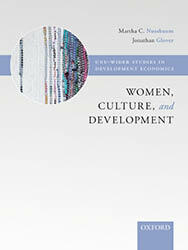Book
Women, Culture, and Development
A Study of Human Capabilities
Women, a majority of the world's population, receive only a small proportion of its opportunities and benefits. According to the 1993 UN Human Development Report, there is no country in the world in which women's quality of life is equal to that of men. This examination of women's quality of life thus addresses questions which have a particular urgency. It aims to describe the basic situation of all women and so develops a universal account that can answer the charges of 'Western imperialism' frequently made against such accounts. The contributors confront the issue of cultural relativism, criticizing the relativist approach which, in its desire to respect different cultural traditions, can result in indifference to injustice. An account of gender justice and women's equality is then proposed in various areas in which quality of life is measured. These issues are related throughout to the specific contexts of India, Bangladesh, China, Mexico, and Nigeria through a series of case studies. Disciplines represented include philosophy, economics, political science, anthropology, law, and sociology.
Like its predecessor, The Quality of Life, this volume encourages the reader to think critically about the central fundamental concepts used in development economics and suggests major criticisms of current economic approaches from that fundamental viewpoint.
 Join the network
Join the network